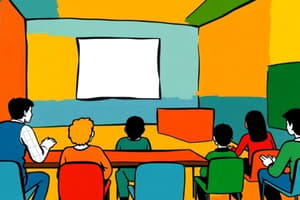Podcast
Questions and Answers
Which factor is NOT mentioned as a student's reading problem?
Which factor is NOT mentioned as a student's reading problem?
- Formulation of objective
- Cognitive factors (correct)
- Evaluation
- Emotional factors
According to Thorndike's theory, what does punishment NOT achieve?
According to Thorndike's theory, what does punishment NOT achieve?
- Weakens a response
- Prevents future behavior
- Strengthens a response (correct)
- Removes a response
In Krathwohl's affective domain of objectives, which level is the highest?
In Krathwohl's affective domain of objectives, which level is the highest?
- Responding
- Receiving
- Organization
- Characterization (correct)
John Watson's perspective on development emphasized which aspect?
John Watson's perspective on development emphasized which aspect?
In performance objectives, what is NOT typically included?
In performance objectives, what is NOT typically included?
What type of play is characteristic of children aged four?
What type of play is characteristic of children aged four?
Which behavioral term is associated with the highest level of Bloom's taxonomy?
Which behavioral term is associated with the highest level of Bloom's taxonomy?
What should a teacher do to assess if learning has attained higher-level thinking?
What should a teacher do to assess if learning has attained higher-level thinking?
What does the adage 'A stitch on time saves nine' imply in the context of classroom management?
What does the adage 'A stitch on time saves nine' imply in the context of classroom management?
Which of the following best describes a teacher's ability to influence students through personal connections?
Which of the following best describes a teacher's ability to influence students through personal connections?
In instructional planning, what should the teacher ensure regarding the lesson plan?
In instructional planning, what should the teacher ensure regarding the lesson plan?
What type of questions do teachers predominantly ask according to research?
What type of questions do teachers predominantly ask according to research?
Which specific technique involves a teacher clear their throat to gain attention?
Which specific technique involves a teacher clear their throat to gain attention?
Which stage of development involves synthesizing skills according to the context given?
Which stage of development involves synthesizing skills according to the context given?
Which assumption is incorrect regarding the observable nature of learning?
Which assumption is incorrect regarding the observable nature of learning?
What characterizes 'Valuing' in Krathwohl's taxonomy of objectives?
What characterizes 'Valuing' in Krathwohl's taxonomy of objectives?
Flashcards
Task Breakdown
Task Breakdown
Dividing a complex task into smaller, more manageable parts, each with its own set of skills or steps.
Initiative
Initiative
The ability to use initiative, take charge, and be proactive in achieving goals.
Genital Stage
Genital Stage
A stage in psychosexual development where the libido is focused on the genitals and the individual explores their sexuality.
Performance Objective
Performance Objective
Signup and view all the flashcards
Individual Differences
Individual Differences
Signup and view all the flashcards
Sense of Belonging
Sense of Belonging
Signup and view all the flashcards
Expert Power
Expert Power
Signup and view all the flashcards
Convergent Question
Convergent Question
Signup and view all the flashcards
What does a teacher's lesson summary do?
What does a teacher's lesson summary do?
Signup and view all the flashcards
How does punishment affect behavior according to Thorndike?
How does punishment affect behavior according to Thorndike?
Signup and view all the flashcards
What is the lowest level of Krathwohl's affective domain?
What is the lowest level of Krathwohl's affective domain?
Signup and view all the flashcards
What is the main characteristic of a constructivist teaching approach?
What is the main characteristic of a constructivist teaching approach?
Signup and view all the flashcards
What is the acceptable standard in mastery learning?
What is the acceptable standard in mastery learning?
Signup and view all the flashcards
What is the highest level of Bloom's Taxonomy?
What is the highest level of Bloom's Taxonomy?
Signup and view all the flashcards
Which play characteristics are typical of a 2-year-old?
Which play characteristics are typical of a 2-year-old?
Signup and view all the flashcards
Why might a child like Rodel be aloof in his relationships according to Erikson's theory?
Why might a child like Rodel be aloof in his relationships according to Erikson's theory?
Signup and view all the flashcards
Study Notes
Student Reading Problem Categories
- Formulation of objectives
- Evaluation of emotional factors
- Neurological factors
Teacher's Summary of a Lesson's Functions
- Links lesson parts, showing how information is connected
- Provides for full student participation
- Strengthens responses
- Presents basic lesson concepts
Punishment and Learning (Thorndike's Theory)
- Punishment weakens a response, not necessarily removing it
- Punishment may deter future similar behaviors, though removal is not guaranteed.
Krathwohl's Affective Domain Levels (Lowest to Highest)
- Receiving
- Responding
- Valuing
- Organization
- Characterization
Differentiating Sex Differences in Learning Assessments
- Some assessments are not appropriate for distinguishing sex differences in learning.
Constructivist Lesson Planning
- Reciprocal teaching is a suitable constructivist lesson approach
Mastery Learning and Acceptable Performance Standards
- A SMART (Specific, Measurable, Achievable, Relevant, Time-bound) behavior defines an acceptable performance standard.
Types of Play (Characteristic of Four-Year-Olds)
- Associative and cooperative play are the most characteristic types for four-year-olds
Lesson Objective Example
- The primary objective of this lesson is to enable students to add fractions correctly. A sub-objective to accomplish this is to properly 'recognize the numerator from a denominator.'
- Objectives should clearly define what learners are supposed to learn
Psychological Development
- Erickson's stages of development relate to possible psychological characteristics in a child.
Stages of Psychosexual Development (Freud)
- The stages of psychosexual development (for example: oral, anal, phallic, latency, genital) describe a set of developmental milestones in a child
Assumptions about Teacher Use of Authentic Assessment
- Not all learning is observable
- Performance objectives assure learner of learning
- Learner success is based on observed learner performance
Addressing Individual Differences in Learning
- Provide a variety of learning activities
- Consider different learning styles
Instructional Planning
- Instructional planning requires a logical flow from beginning to end
Goal-Oriented Instruction
- Goals should result in planned activities and topic identification
Teacher Power
- A teacher can exert certain power types during the school day
Teacher Communication and Influence
- Different techniques of power and influence can be employed by a teacher
Bloom's Taxonomy
- Bloom's Taxonomy describes different cognitive learning objectives
Lesson Objective Example (Synthesizing)
- A lesson objective related to the skill of synthesizing might involve the ability to appraise or theorize.
Krathwohl's Taxonomy of Objectives
- The most basic level in the taxonomy is receiving, and the highest is characterization.
Classroom Management: "A Stitch in Time"
- Addressing minor disruptions promptly prevents larger problems later.
- Firmly established classroom rules, and consistent enforcement of them, are critical components of effective management.
Teacher Power Types
- Referent power might be achieved by showcasing competence.
- Examples of other teacher power involve reward and expert power.
Teacher Questioning Styles
- Content questions are frequently asked by instructors.
Studying That Suits You
Use AI to generate personalized quizzes and flashcards to suit your learning preferences.




